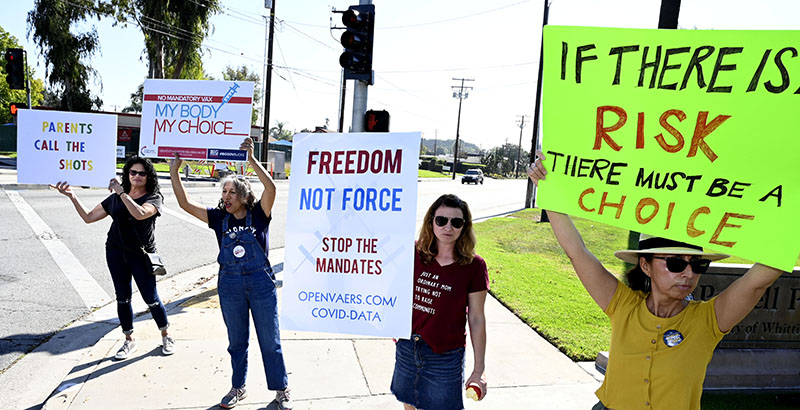Parents’ Poll: Less Than Two-Thirds Give Schools Top Grades for Handling Students’ Pandemic-Related Academic, Social-Emotional Needs

Less than two-thirds of parents give schools an A or B for their handling of students’ academic and social-emotional needs during the pandemic, and almost 60 percent said they haven’t seen or heard anything about additional resources their schools can provide to address these issues, according to a new poll released Monday.
Sixty-one percent assigned top grades for how their child’s school is “addressing any learning challenges related to the pandemic,” and 60 percent gave an A or B for “providing resources to support students’ mental health.”
Schools get higher marks, however, for keeping parents updated on school policies, assessing where children stand academically and even requirements regarding vaccines, masks and quarantines. Almost three-quarters of parents give schools an A or B in these areas.
Keri Rodrigues, president of the National Parents Union, which conducted the survey, said the results suggest parents are “still in the trenches with teachers” but have less faith in the nation’s leaders to make bold improvements to schools. Thirty-eight percent of the sample of just over 1,000 parents give President Joe Biden an A or B on handling schools’ responses to the pandemic, and thirty-six percent give Education Secretary Miguel Cardona high grades on that question.
Over half of respondents said they’ve heard “not much” or “nothing at all” about federal relief funds or how they can be used for education.
“Why does everything look and feel the same?” Rodrigues asked. “[Parents] are not feeling the impact of this money.”
Conducted 20 times since the beginning of the pandemic, the advocacy organization’s poll captures parents’ opinions on the most pressing COVID-related issues facing schools and families — from parents’ willingness to vaccinate their children to how well they think schools are serving students with special needs. Over time, Rodrigues said she has seen parents consistently say they’re concerned about their children’s well-being, but that overall, schools “failed to listen to us.”
Some district leaders say they’re hearing the similar concerns about students’ emotional and behavior needs from their staff. In the Anoka-Hennepin School District in Minnesota, Superintendent David Law noted that focusing on students’ mental health needs is a top priority for teachers.
“Students are needier than they were in the past,” he said, adding that in his district of 37,000, the 20 percent that did not return to in-person learning last year are “really struggling with the transition” this year.
But even though schools now have the money to hire more counselors and social workers, “the personnel can’t be had,” said Daniel Domenech, executive director of AASA, the School Superintendents Association. Addressing those behavioral and emotional needs is “falling more and more on the shoulders of classroom teachers.”
The latest results, gathered by Echelon Insights, which conducts opinion research, show 40 percent of parents consider staffing shortages to be a major or moderate problem at their child’s school. Almost the same percentage responded that student behavior issues are affecting learning, and about a third said behavior issues were serious enough to create safety risks.
While parent protests and disruptions at school board meetings have dominated the news, just 16 percent of parents responding consider conflicts over masks, vaccines or quarantine policies to be a major problem in their children’s schools. More than half answered that disagreements over these issues are either a minor problem or non-existent.
But in some parts of the country, those debates are more intense, and Domenich said superintendents losing their jobs over mask mandates don’t view the issues as minor.
“In [the Houston Independent School District], we definitely saw the divide with parents on mask mandates after Superintendent [Millard] House and the school board voted for mask mandates,” said Wendy Gonzales-Neal, a National Parents Union delegate in Texas and the executive director of advocacy group My Child My Voice. “Parents are fighting with schools and our elected officials to keep our kids safe.”
Despite districts’ increasing use of test-to-stay policies — which allow close contacts of students who test positive for COVID-19 to avoid quarantine — just over half of parents, 53 percent, still think students who have been exposed should stay home from school for at least 14 days.
About a third said schools should allow students to come back to class as long as they test negative multiple times in a week, and 5 percent said schools shouldn’t do anything if students are exposed.
Parents just want consistency, Rodrigues said.
“Quarantines are a toss up. They can change from school to school,” she said. “We can’t control COVID, but parents need to know what is going to happen.”
Disclosure: The Walton Family Foundation, the City Fund, the Bill & Melinda Gates Foundation, the Chan Zuckerberg Initiative, the Charles and Lynn Schusterman Family Foundation and the Carnegie Corporation of New York provide financial support to the National Parents Union and The 74.
Get stories like these delivered straight to your inbox. Sign up for The 74 Newsletter

;)
